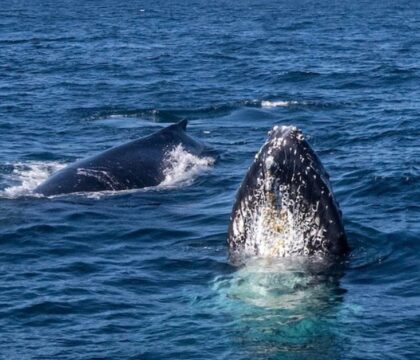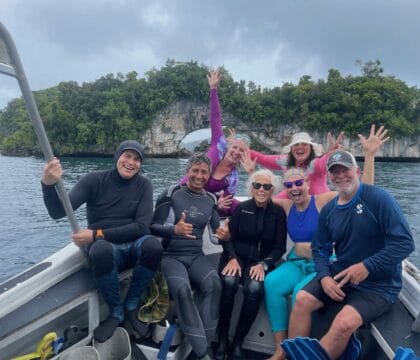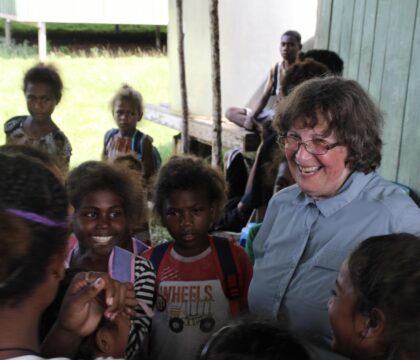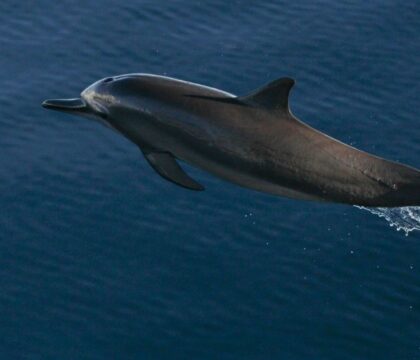March 15, 2024 • Travel Ideas
Have you ever wanted to travel and give back to the environment at the same time? Are you interested in visiting incredible destinations, experiencing different cultures, and meeting people with shared interests and values? Are you captivated by seeing wildlife up close, learning about key issues, and participating in hands-on research that can help conserve threatened marine species?
If you answered yes to any of the above, then one of our volunteer abroad programs may be perfect for you. Oceanic Society’s volunteer vacations offer travelers rewarding, life-changing experiences that combine exploration and adventure with impactful work to help save the environment.
Here are 5 inspirational volunteer abroad programs that give back to nature:
1. Volunteer Abroad with Sea Turtles in Trinidad
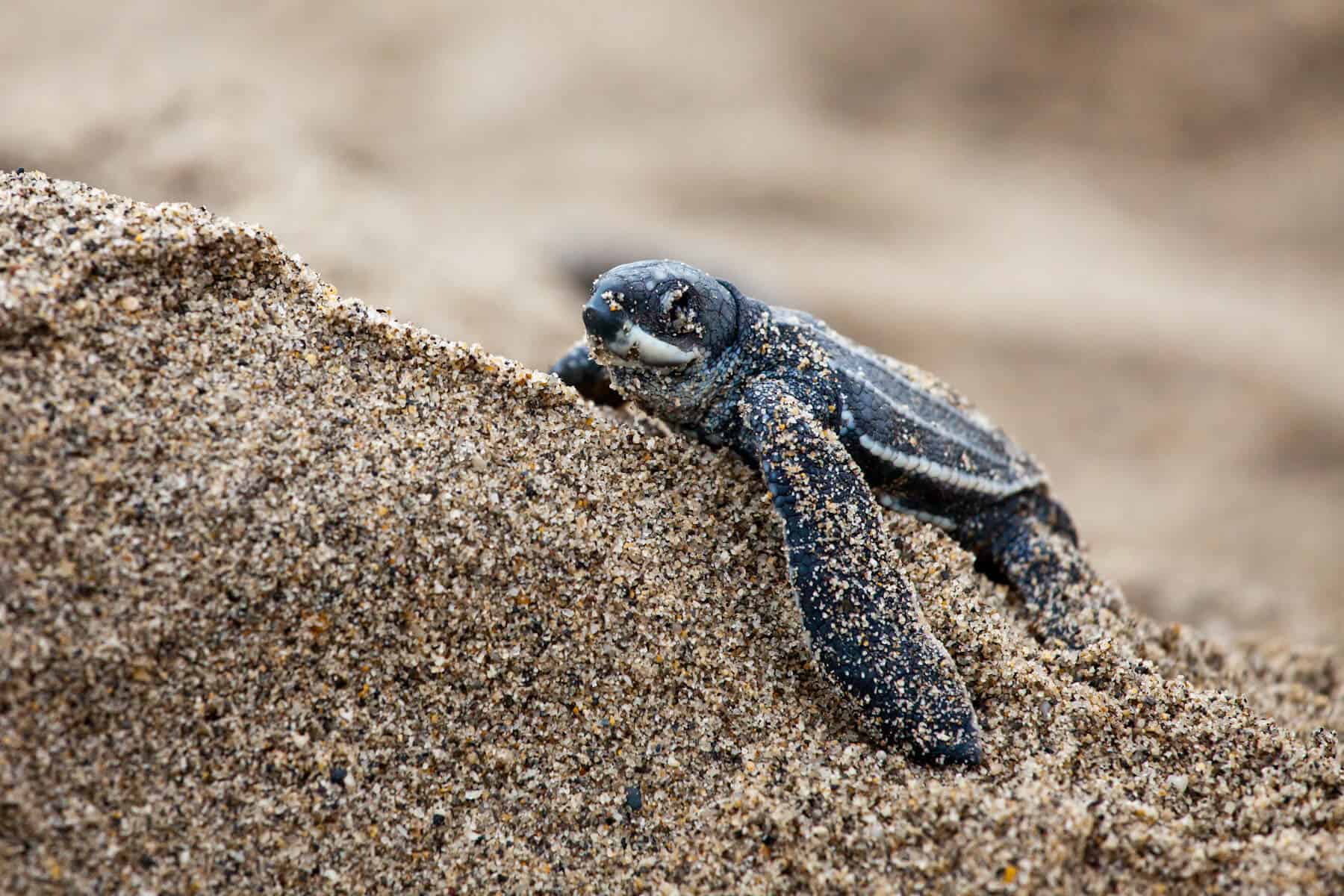
Volunteer abroad with sea turtles in Trinidad, home to the world’s largest concentration of nesting leatherback turtles. © Brian J. Hutchinson
Join us as a sea turtle volunteer on the beaches of Trinidad to see and study the amazing leatherback turtle at one of the world’s most important nesting sites. With roughly 20,000 nests laid per year, Trinidad hosts the world’s densest leatherback nesting colony, and we have timed this volunteer trip to coincide with the peak of their nesting season.
Why we love it: Leatherback turtles are the largest of all sea turtles and also among the rarest. There’s no better place and no better time to see them than Trinidad in April-June. Participants on this volunteer abroad program will see multiple turtles per night as they get hands-on in helping with research.
How we give back: Leatherback turtles are threatened with extinction globally, and long-term monitoring of their nesting populations provides critical information to monitor their status. Our volunteers lend needed support to our local partner, Nature Seekers, a community-based organization that has been studying and protecting sea turtles in Matura, Trinidad for decades. Volunteers’ labor and visitor fees provide needed support to Nature Seekers’ work.
Volunteer trip duration: 9 days
Timing: May, during peak nesting season
2. Help Study Manatees, Sea Turtles, Coral Reefs, and More in Belize
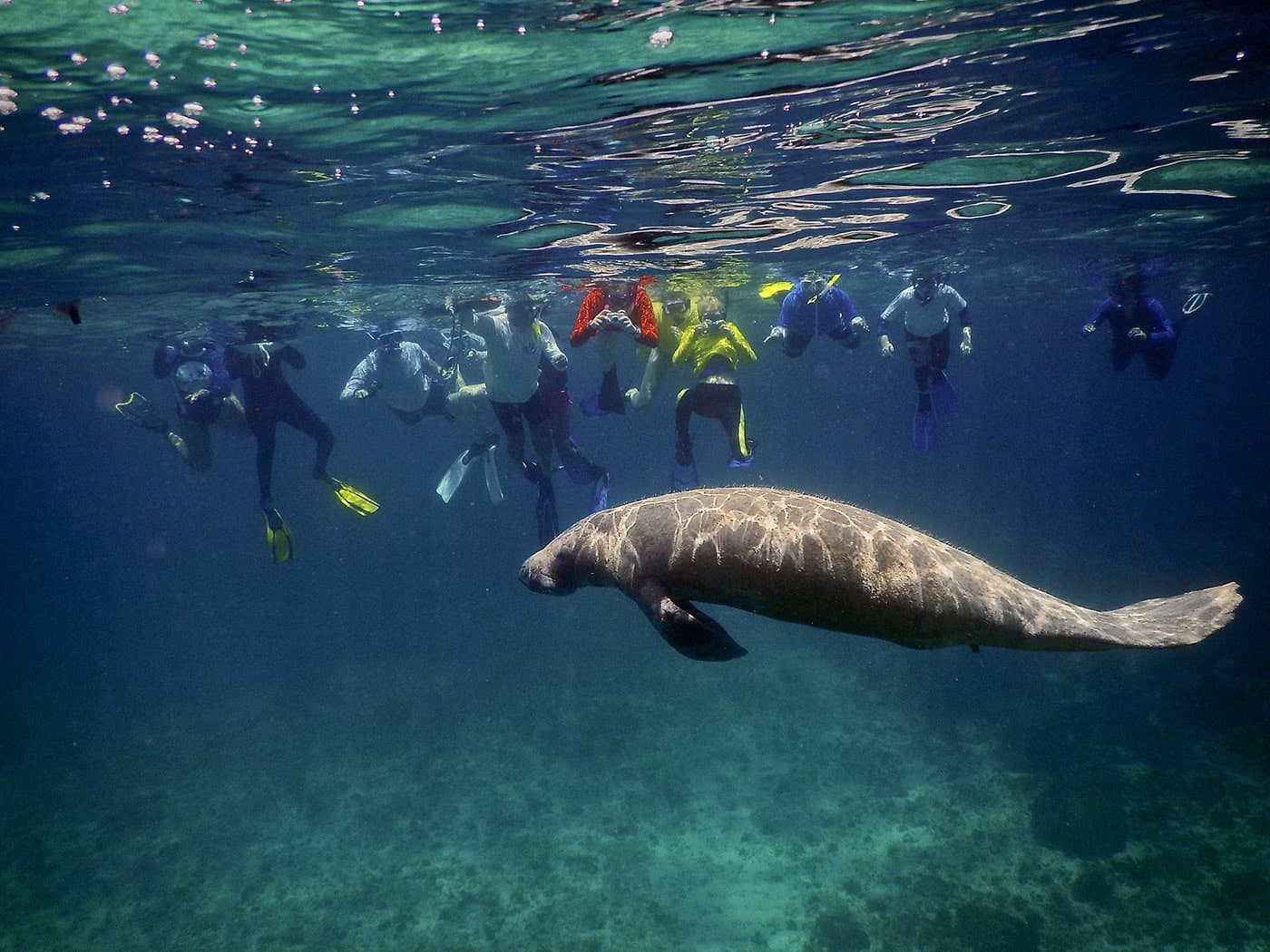
See and study endangered marine wildlife while volunteering abroad in Belize. © Linda Searle
Nestled on a beautiful private island east of Belize City, our volunteer research trips in St. George’s Caye, Belize offer the chance to help study coral reef health and monitor endangered manatees and sea turtles, Atlantic bottlenose dolphins, and queen conch populations in partnership with ECOMAR, a Belizean non-profit.
Why we love it: This trip is a fantastic experience to soak in the sun, snorkel, and see wildlife that inhabit coral reefs, seagrass beds, and mangrove forests. One of the highlights is a day spent at Hol Chan Marine Reserve, which is often cited as one of the best snorkeling sites in Belize.
How we give back: The data collected by volunteers adds to an annual report that is shared with the St. George’s Caye Village Council and Fisheries Department. The department uses the data to provide evidence that the area is critical habitat for threatened and endangered species. Our goal is to show that building and maintaining a marine reserve will help nurture coral reef health inside and outside the reserve and protect key threatened species.
Volunteer trip duration: 6 days
Timing: Varies. Typically August.
3. Monitor Coral Reefs in Puerto Rico
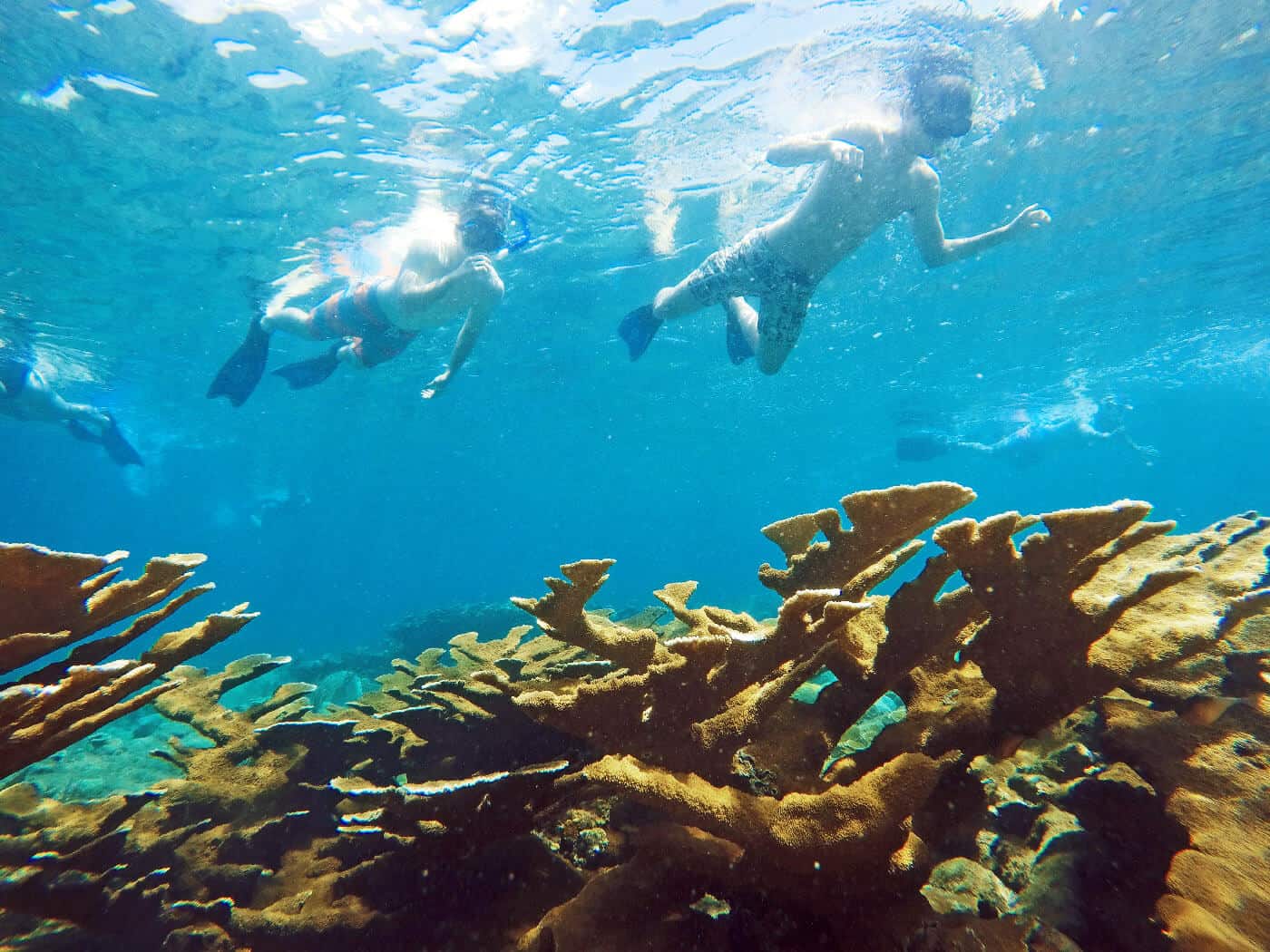
Help monitor coral reef health in Puerto Rico while learning to identify reef fish. © Isla Mar
Located in the heart of the Caribbean, Puerto Rico’s reefs are rich in biodiversity. Once dominated by agriculture and fisheries, the economy of the sleepy western beach town of Rincón is now driven by tourism. In an effort to protect the area’s beaches, coral reefs, and wildlife from coastal development, the community established the Tres Palmas Marine Reserve in 2015.
In partnership with Amigos de Tres Palmas, our trip helps researchers monitor coral reef health by gaining a better understanding of the issues that impact the local marine species including marine debris, climate change, coral bleaching, and invasive lionfish.
Why we love it: Puerto Rico has beautiful coral reefs, chock-full of schools of fish, elkhorn corals, brain corals, stony corals, and sea fans. The trip offers a fantastic opportunity to experience Puerto Rico’s rich culture, sharpen your reef fish ID skills, become familiar with field techniques used to evaluate the health of coral reefs, and help local scientists monitor the health of the Tres Palmas Marine Reserve. Another highlight is the day spent snorkeling at the picturesque, offshore remote reefs of Desecheo Island.
How we give back: Data gathered during the trip is used to help show that the newly established marine reserve is helping to preserve Puerto Rico’s marine resources.
Volunteer trip duration: 8 days
Timing: Summer, typically July/August.
4. Study Sharks & Coral Reefs in Palau while Scuba Diving
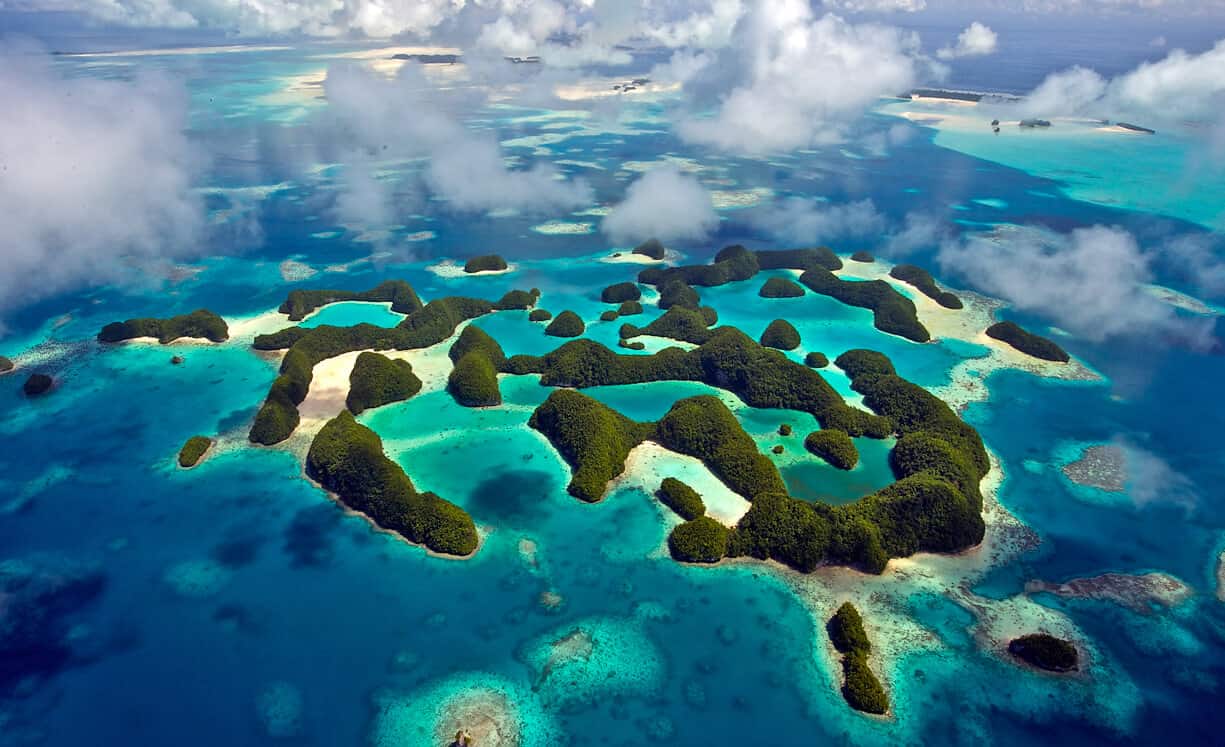
Help study sharks and coral reefs in Palau’s Rock Islands. © Fish N Fins
Known for its vibrant corals, abundant fish populations, breathtaking jungle-capped, mushroom-shaped limestone islands, and pristine aqua-blue waters, Palau is one of the nicest snorkeling destinations in the world. The tiny island nation made headlines in 2015 when they designated almost their entire ocean territory, 193,000 square miles, as a marine protected area.
Researchers in Palau are now studying the linkage between shark abundance and coral reef health. In partnership with the Micronesian Shark Foundation, participants on this snorkel and scuba flexible trip will learn to identify and survey sharks, corals, and reef fish in order to compare reef health in areas of varying shark abundance.
Why we love it: Palau has more than 1,500 species of fish, 300+ species of soft coral, and 400+ species of hard coral—it is stunning! Seeing and studying healthy populations of sharks in the wild is a once in a lifetime experience!
How we give back: The data collected on this trip helps researchers to see if there are any patterns between shark abundance and overall reef health and reef fish behaviors.
Volunteer trip duration: 9 days
Timing: Varies. Typically March.
5. Study Manta Rays in the Azores while Scuba Diving
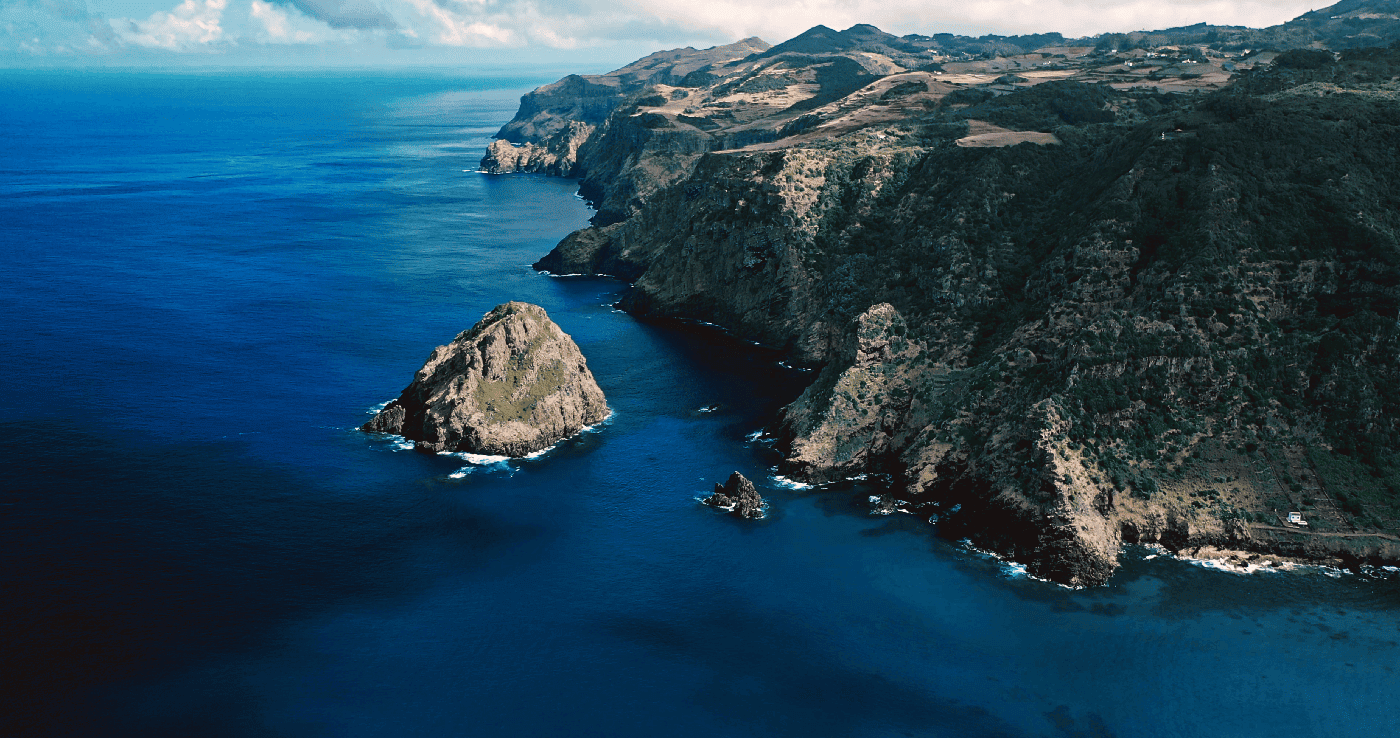
Our manta ray volunteer program takes place around stunning Santa Maria Island, Azores. © Pepe Brix
In the North Atlantic Ocean, the breathtaking Azores Islands of Portugal are gaining international acclaim as a nature destination, yet still relatively “undiscovered” by tourism standards. The Azorean Sea is home to a high diversity and richness of marine life, and it is a hotspot for large pelagic species like manta rays and sicklefin devil rays, the focus of our trip, as well as whales, sharks, dolphins, and sea turtles.
Our scuba diving volunteer trip in the Azores will have volunteers in the water twice daily at exclusive, protected locations with crystal-clear waters (reaching up to 40 meters visibility), untouched nature, and a huge variety of underwater geological formations and amazing diving sites. Alongside researcher Ana Filipa Sobral, the Manta Catalog Azores conservation project leader, volunteers help photograph and catalog rays in support of conservation efforts.
Why we love it: Diving at Santa Maria island in the Azores is a very exclusive experience, with limited visitors allowed in order to protect this special place. The unique and diverse dive sites here offer a special experience for even the most seasoned divers, all while supporting ray conservation. Above the surface, Santa Maria Island is a stunning natural gem, known for its white sand beaches.
How we give back: This volunteer trip is led in partnership with Oceanário de Lisboa and designed specifically to support manta and devil ray research and conservation. Volunteers support the work of local researchers through their participation, and contribute data to Manta Catalog Azores.
Volunteer trip duration: 8 days
Timing: Summer (July, August, early September).

